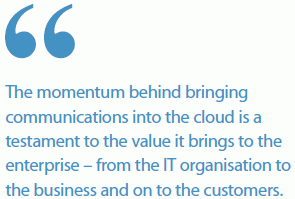Published on the 21/12/2010 | Written by Brendan Maree

An expert in business communication solutions reveals that cloud service delivery has become more than a novel new way to deploy applications. He says it’s bringing huge value, ending the days of long deployment cycles, huge investments, and costly support contracts…
Cloud computing has quickly established its rightful place in modern IT organisations, helping enterprises become more agile while keeping close watch on costs. As a new mainstream appeal, the new delivery model has proven its stripes with applications like messaging, storage and CRM. Now, technology innovators are applying what they learned. Cloud service delivery has hit critical mass, with the majority of organisations already riding the wave. With that adoption, enterprises have become more comfortable with this innovative service delivery model and their newfound confidence in paving the way to exciting new cloud opportunities. The next big wave of cloud-bound application is business communications. A majority of companies have started to bring business communications into the cloud as they are seeing business benefits and gaining a healthy ROI with the migration. Cloud service delivery has become more than a novel new way to deploy applications. Since its inception, it has evolved quite quickly into a strategic detective for many companies. It is a way for companies to focus on their core business, offloading IT management to trusted third parties. With all the early-adopter barriers crumbling, it has effectively become a new way of life for IT organisations. Interest growing The function includes business-essential applications, such as inbound and outbound call centre automation, IP PBX, interactive voice response and more. In general, many have indicated that business communications applications are a good fit for cloud delivery. Cloud delivery is applicable across the whole spectrum of business communications – from basic PBX functionality to sophisticated call centre technology. BUSINESS VALUE FOR ALL The IT organisation The business Hence, its add-as-you-grow purchasing model becomes a strong business driver. Such cost benefits certainly apply to implementing a blended contact centre application, which can be laden with upfront capital outlays and little predictability in terms of future capacity. This is no doubt a much more cost- effective way to meet communications needs without a heavy investment. Not to mention, all those cloud-triggered cost savings can be funnelled into the business. At the same time, there is value associated with being able to focus solely on the call centre and reacting quickly to the fast-changing environment. All the time and energy normally dedicated to infrastructure can now be diverted into growing revenue streams. The other stakeholders CLOUD CONCERNS Security Fortunately, vendors are working hard to overcome this objection, and good solutions comply with security standards and best practices. Organisations should consider cloud solutions with enhanced security standards. For example, look for cloud-based communication solutions that are delivered from a SAS-70 type II monitored data centre. Organisations should also look for architectures that allow the voice and call recordings to remain on their corporate network. In addition, it is prudent to create security checklists and hold vendors accountable to relevant standards. Reliability For example, in a scenario where an organisation has a dedicated virtual server, the first user is unaffected by another’s CPU utilization drags because with a cloud-based IP PBX, each user has its own isolated virtual environment. That isolation also ensures higher security. Control Culture Some IT professionals have spent their entire careers in server rooms dealing with data feeds and product rollouts. Now that someone else does much of the work, they may experience a huge cultural change. Cloud computing is no longer just a concept. It is now being adopted rapidly by many of the biggest and most trusted companies in the world. With cloud computing, the days of long deployment cycles, huge investments, and costly support contracts are gone. Of course, achieving successful migration is not without its barriers but get it right and we can tap into talent, reduce costs, differentiate and create a more flexible effective workforce. Ultimately, cloud-based communications must be seen as a solution laced with many benefits and not one that is looking for a problem. …
In an attempt to uncover just how ingrained that new way of life has become, IDG Research Services queried approximately 150 technology and business leaders across a range of industries. The research determined that 81 percent of responding companies are indeed already using or planning to use cloud-based applications. One application that is cresting the adoption wave is business communications.
The momentum behind bringing communications into the cloud is a testament to the value it brings to the enterprise – from the IT organisation to the business and on to the customers.
From an IT perspective, moving communications to the cloud creates day-to-day impact. Primary benefits of the service delivery model include reduced IT staff requirements and faster deployment. For example, the IT department in an organisation can hand off the burden of a cloud-based IP PBX, and monitoring of the equipment 24/7 to a capable vendor. That translates into faster deployment because the vendor does all the heavy lifting. The IT staff that would normally be responsible for maintaining the system can be redirected to more strategic projects.
Cloud delivery requires little to no upfront capital expenses.
Cloud delivery also enhances communication for customers, employees, partners and other key stakeholders. For example, new functionality can be brought into a cloud-based interactive voice response system to improve customer interactions on a more frequent basis. Instead of waiting for a major release from a vendor, customers benefit from the latest and greatest capabilities as soon as they’re available.
Receptiveness to cloud-based business communications solutions is on the rise. Perhaps, this is because there are no real technology hurdles standing in the way. Most concerns reflect the challenges that once plagued early adopters of cloud service delivery. But the industry has come a long way toward overcoming those top barriers:
The perceived lack of security is a top concern for most organisations.
Smart vendors are putting considerable effort into ensuring high availability.
Today, vendors recognise their customers’ need for control and visibility into their hosted applications. Find a solution that allows for some level of monitoring and access; for instance, an application with access to a Web portal for reporting, administrative changes, billing information and configuration control.
Of course, the biggest intangible concern is the culture shift.
































